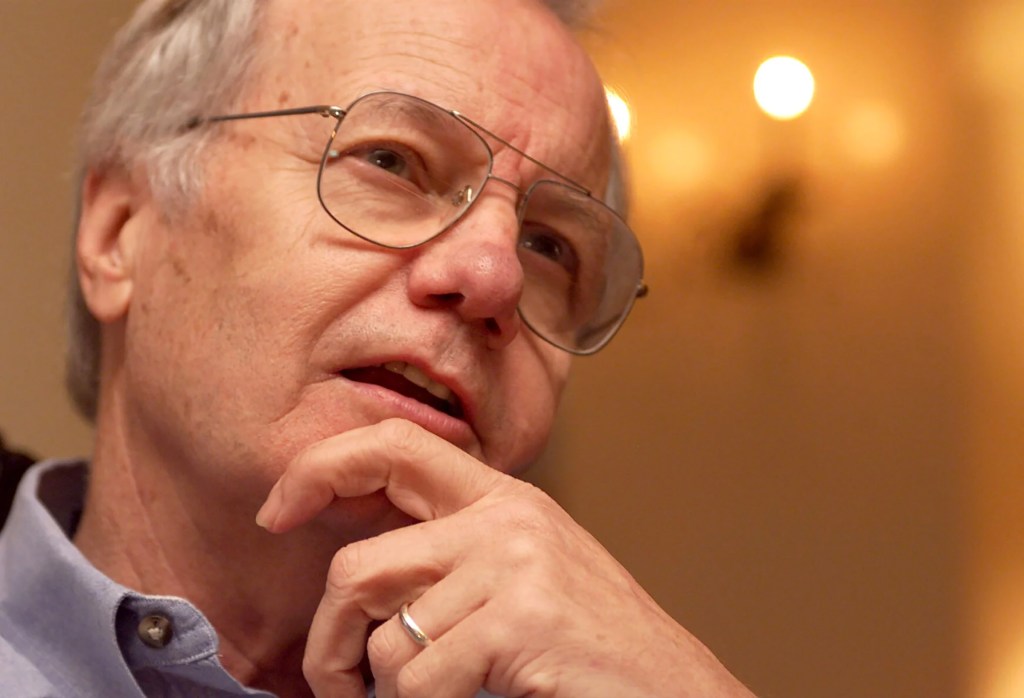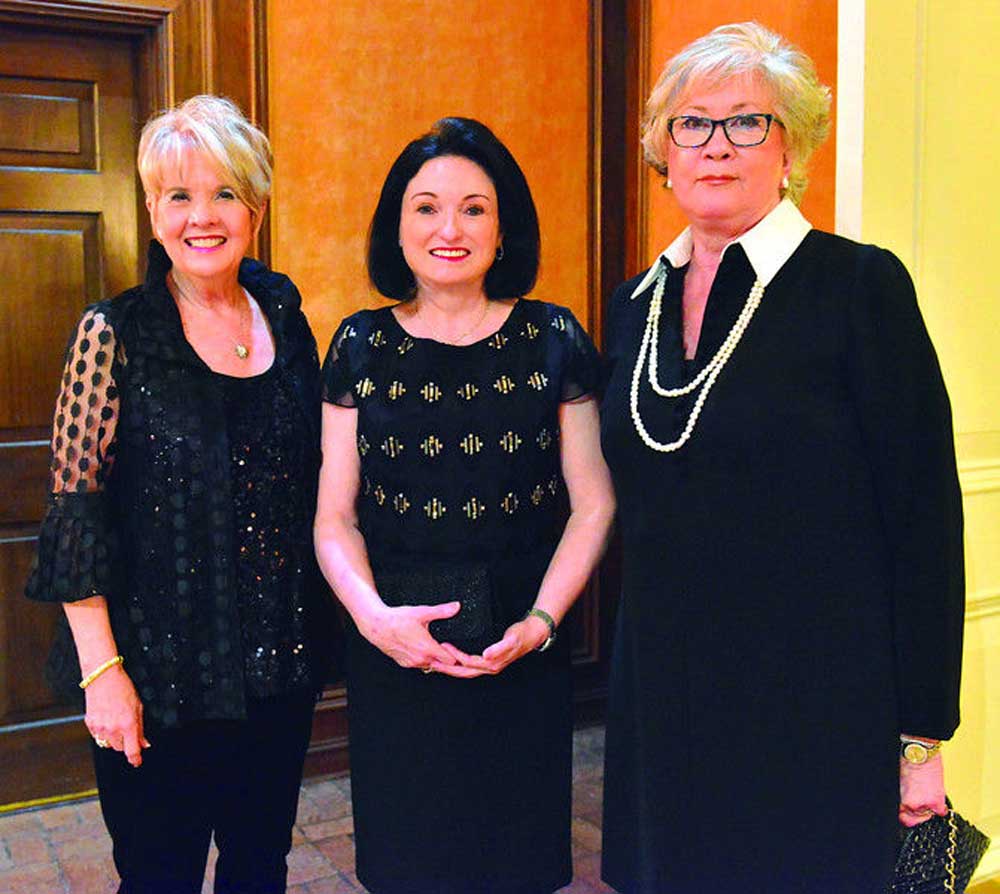Famed journalist Moyers recalled as proud ambassador of East Texas
Published 11:45 pm Saturday, June 28, 2025

- Bill Moyers speaks in October 1999 during an interview at the Mayflower Hotel in Washington, D.C. (TNS Photo)
Those who knew Bill Moyers say he leaves a rich legacy not only as a notable journalist but as a proud Marshallite who loved his East Texas roots, his country and humanity.
Moyers died Thursday at a New York hospital after a long illness, his son confirmed to the Associated Press. He was 91.
“Marshall, Texas, has lost a remarkable native son with the passing yesterday of Mr. Bill Moyers,” said Richard Anderson, a former Harrison County judge and former state senator.
Moyers began his journalism career at age 16 as a reporter for his hometown newspaper, The Marshall News Messenger, before eventually becoming a White House aide, first working as deputy director of the Peace Corps under President John F. Kennedy and the press secretary to President Lyndon B. Johnson.
“Bill had a remarkable career in public service, journalism, political analysis and the medium of television,” Anderson said. “He was the winner of over 30 Emmy awards, 11 Peabody awards and multiple other accolades in journalism.”
Moyers was editor-in-chief and host of “Bill Moyers’ Journal” on PBS. Additionally, he was Newsday publisher; Rockefeller Foundation trustee; founder and executive director of Public Affairs Television; and creator of independent television specials including “Healing and the Mind:” “In Search of the Constitution;” “God and Politics,” and “What Can We Do About Violence.” He additionally served as a news analyst and commentator for the CBS Evening News alongside Dan Rather.
“He was obviously a brilliant journalist, but having spoken with him on multiple occasions beginning with my first term as county judge and continuing for 30 years, I can attest to the fact that one of his greatest virtues was that he was an intense listener. When you spoke, there was no one else in the room,” Anderson said. “He was not anxious to move on to another person.”
Moyers’ legacy left such an indelible mark that thinking of his career brings 80-year-old former News Messenger reporter James Haynes to tears.
Haynes now lives in Blue Lake, California.
“At my first newspaper job at the Marshall News Messenger, which was also Bill Moyers’ first job, he often was in town to visit his parents and stopped in the newsroom to say hello,” Haynes said. “He went around each desk asking reporters what they were working on. Moyers acted like my story on the (city council) was every bit of important as one (national story) today, and we loved him dearly.”
Moyers was fondly known as “the man closest to the president” as he went to work as special assistant to Johnson during the Vietnam War.
To Audrey Kariel, Marshall’s first female mayor, he was a longtime family friend.
“This mayor is heartbroken,” said Kariel, 93. “He was such a dear, sweet friend.”
Kariel, who led the charge to build the Marshall Public Library, said Moyers was instrumental in the project, serving as a national honorary committee member alongside Harrison County native and first lady Lady Bird Johnson.
“I was working on the library, and I decided to form a national honorary committee to help me with it, and Lady Bird was chairman of my national committee and he was vice president,” Kariel said. “They helped me with the library from about 1969 to 1973 until it was built. So that was my first introduction to him.
“After we built the library, we still needed books, so he came home and did a fundraiser for me in the Gold Room,” she said. “His speech was so beautiful that the Marshall News Messenger printed it verbatim.”
Kariel said Moyer’s former boss and former News Messenger Publisher Millard Cope made such an impression on Moyer’s career that he named his son, Cope, after him.
Rodney Gilstrap, U.S. District Judge for the Eastern District of Texas-Marshall Division and former Harrison County judge, said he had the privilege of getting to know Moyers over the years and found him to be a great ambassador for the Marshall community.
“Marshall was always in his heart and in his thoughts. He was here often to visit his mother and to stay in touch with his hometown,” Gilstrap said. “’I got to know him through various community events and while I served as county judge.”
“He was a constant ambassador for Marshall wherever he went,” he said. “He was a genuinely kind and insightful person who always challenged you intellectually on almost any topic that was discussed. He represents the best of what a small town can and does produce.”
Hometown contributions
In addition to helping with construction of the library, Moyers assisted Kariel with her efforts to save Marshall’s historical Texas and Pacific (T&P) Depot, which was threatened to be demolished.
Kariel, along with her husband, Louis Kariel Jr., spearheaded a project in the late 1980s to renovate the passenger station and establish a museum there instead.
“I went through seven different lawyers trying to get the depot in some way so we can restore it, and Bill knew. I was looking and needed help, and he and Judith, his wife who loved Marshall, too, they both worked with me,” Kariel said. “They spoke to the president of Union Pacific on our behalf. Those were stories that were never public, but they loved Marshall and he did everything he could to help us.”
“He was just so interested in everything going on in Marshall,” she said.
Moyers’ support was also felt during the renovation project of the historic 1901 Harrison County Courthouse. During that time, the late historian and local journalist Gail Beil organized a fundraising dinner with Moyers to raise money for the project.
“Then we had a reception for him,” said Kariel, noting he was guest speaker. “I don’t think people realized how he came and worked with us. Oh, it was such a wonderful speech.”
Kariel said during the celebration of Marshall’s 150th birthday, Moyers also returned home to serve as the keynote speaker for that occasion, which was at the stadium of the then-new integrated Marshall High School. His speech is preserved at the Harrison County Historical Museum.
“It was absolutely the best speech I ever heard given,” Kariel said. “It was just perfect. We had just built the new high school; everybody had got integrated. We felt like this was everybody’s birthday, and we wanted to celebrate it in a way that showed off our new high school and showed our community knew how to celebrate together. It was the most beautiful coming home (event). We honored all the people who had achieved national recognition as Marshall is loaded with people who are famous. We play on the world stage because of people like Bill Moyers, people like Lady Bird.
“I think Marshall is very important on the world stage,” Kariel said. “I think the world knows what a wonderful city we have. I think Bill felt that way. Bill was always there. I always could reach out to him.”
Moyers returned home often, including in 2007 for the unveiling of the Harrison County Historical Museum’s Notable East Texan exhibit, a fundraiser featuring him as guest speaker. A standing-room only crowd turned out to meet Moyers and purchase autographed copies of his books.
‘A national treasure’
Moyers also created documentaries such as “Marshall, Texas, Marshall, Texas” and “From D-Day to the Rhine.”
“Marshall, Texas/Marshall, Texas” looks at Marshall’s segregated past featuring three of his former teachers, sisters Selma and Emma Mae Brotze and Inez Hatley Hughes. According to a March 2000 News Messenger article on Moyers’ 1982 development of the documentary, he spent his morning at Caddo Lake interviewing Wyatt Moore, introduced his viewers to East Texas accents and the classic brown pig sandwich while interviewing a fellow classmate at Neely’s Brown Pig restaurant.
“He loved Neely’s. Neely’s was his favorite place. He never came home that he didn’t go to Neely’s,” Kariel said.
For the 90-minute documentary, Moyers also spoke with his mentor, Max Lale, plantation owner Douglass Blocker, historian Hobart Key, and filmed part of the Marshall Maverick-Longview Lobo rivalry football game.
He additionally talked to James Farmer, a Marshall native, civil rights leader, Wiley graduate and founder of the Congress of Racial Equality. Others interviewed were Wiley and Bishop College professor Inez Jenkins and Black physician Isadore Lamothe. The film also features footage of the Wiley A’Capella Choir.
Initially not knowing the direction the film would take, Moyers ultimately dubbed it “Marshall Texas/Marshall Texas” because “we were two towns,” and one knew little of the other, the March 2000 News Messenger article states. The two towns he referred to were the Black one, which made up at least 50% of the city when he was growing up in the 1940s and 1950s, and the white one.
Roger Cramer, editor at the News Messenger at the time, praised Moyers for never forgetting his hometown.
“The Moyers-Marshall relationship seems unique to me,” Cramer wrote. “I have lived and worked in hometowns of other famous people who have quietly ignored their origins. Moyers, by contrast, does not suppress the pride he has in his roots. When allusion to Marshall before a national audience is appropriate, Moyers does not hesitate to make it. To be sure, that recognition says something good about Marshall. But it says something even better about Moyers as a man and as a journalist.”
The documentary of his home drew so much attention that it earned Moyers an Emmy. The Emmy statuette remains on permanent exhibit at the county historical museum.
Moyers, also an ordained Baptist minister, told the News Messenger at the time that his journalism career was also his calling as he considered it a sacred responsibility to be able to try to honor society and human dignity.
“Bill Moyers was never quite satisfied with the status quo,” Anderson said. “He thought that the lot of humanity in America and in the world could be advanced and improved upon. He dedicated himself to this principle in the form of investigative journalism, and inquiry and commentary upon the conditions of government and his fellow human beings — all in his efforts to improve the human condition and his environment. God grant that we may see others like him in the near future, and in the years to come.
“Marshall, Texas, mourns the loss of a distinguished and respected native son. The nation has lost a national treasure.”






